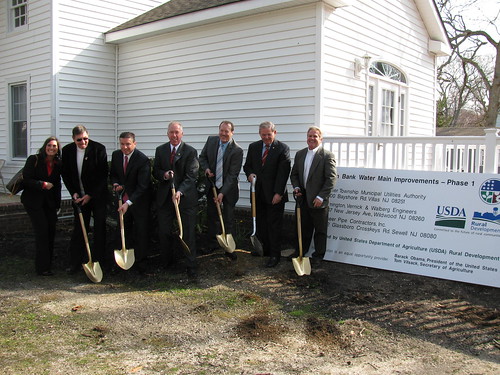
A groundbreaking ceremony took place earlier this month in the Town Bank section of Lower Township, Cape May County, New Jersey, to kick off the first phase of a water main project. USDA Rural Development officials joined Lower Township Municipal Utility Authority, Senator Bob Menendez, state and local officials, and local residents outside the Cape May Beach Property Owners Association Clubhouse. Howard Henderson, New Jersey Rural Development State Director told the crowd that this project is being funded through the American Recovery and Reinvestment Act (Recovery Act), and is the second largest water project awarded in New Jersey.
Senator Menendez stressed one of the fundamental roles of government was to be certain “everyone has access to clean, potable water.” These federal investments will help spur economic growth by creating approximately 23 construction jobs in this small Southern New Jersey community.
Back in 2005, a water testing program discovered that a number of highly toxic contaminants were in private wells in this residential area. Soon after that, the residents asked for a public water supply and today see the light at the end of the tunnel.
After the ceremony concluded I spoke with Elizabeth Williamson a homeowner in the Town Bank section of Lower Township for 13 years. I realized how important it was to her that family and friends would soon have safe tap water to drink. Elizabeth along with many other residents will no longer have to purchase bottled water or pay for the upkeep of their wells. I agree with Elizabeth that the homeowners will welcome a monthly water bill as an alternative for safe water.
To find out how USDA water and Environmental programs can help your community, click here.

